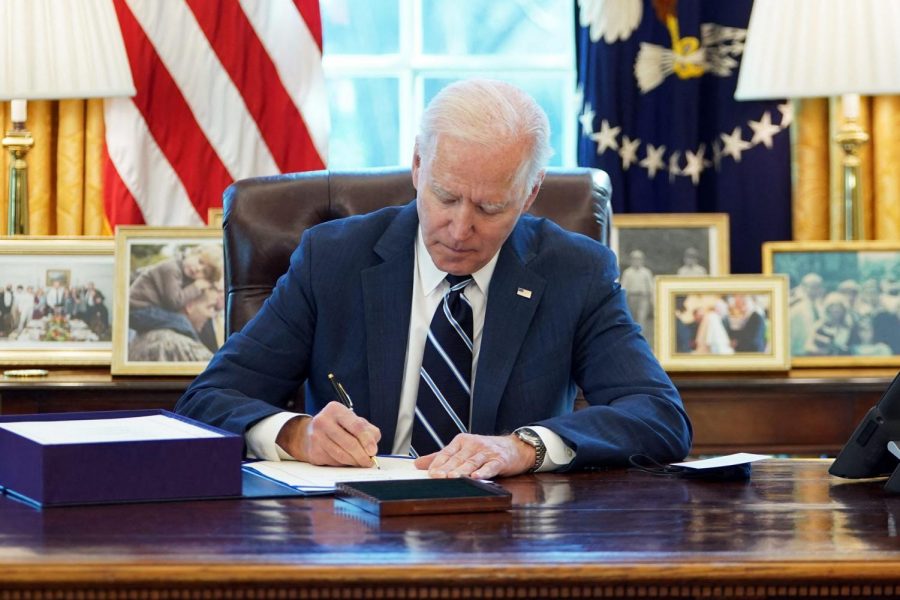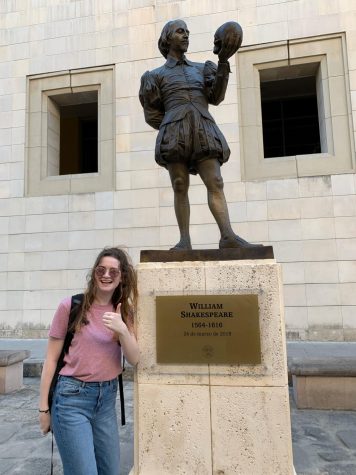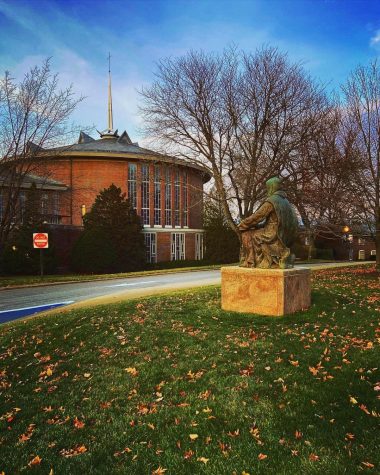Congress passes $1.9 trillion COVID relief bill: Some Anselmians cash in
President Biden signs the Covid-19 relief package on March 11, 2021.
March 31, 2021
President Joe Biden signed a nearly 1.9 trillion-dollar COVID relief bill into law, resulting in $1,400 checks being sent to Americans struggling financially due to the pandemic.
The American Rescue Plan Act of 2021, as the stimulus bill is officially known, was signed into law by President Biden on March 10. The bill passed through both Democrat controlled houses of Congress without any Republican support. The version of the bill which passed did not include an increase in the minimum wage, something which angered many progressive Democrats.
The $1,400 checks will go to people who make less than $80,000 on their own, $120,000 if they are the head of a household, or $160,000 for couples. The COVID relief bill also extends $300 unemployment benefits until Sept. and expanded a child tax credit for a year. The bill will also spend nearly $20 billion on funding vaccinations, $25 billion on business relief, and $350 billion on state and tribal governments, according to CNBC.
James Hanron ’21 was one of the millions of people who received a stimulus check. Hanron told the Crier “from a personal standpoint, I’m a fan.” Hanron continued, saying he was going to spend it on “groceries for the rest of the semester and anything else I feel like spending money on, like clothes or a haircut.”
Hanron embodies what the Biden administration and the Democrats hope for; that instead of saving the money, Americans would use the influx of cash to buy groceries and amenities, thus pumping money into the struggling economy. This would in turn allow the United States to recover economically from the pandemic quicker than if no relief bill was passed. It was for this reason Democrats decided to pass the bill by themselves rather than waiting for Republican support.
Needless to say, the bill’s $1.9 trillion price tag made it the biggest relief package passed by Congress since FDR’s New Deal to combat the Great Depression. Political commentators have noted how the bill is a rebuttal of the mentality present in government since Reagan declared “the most terrifying words in the English language are: I’m from the government and I’m here to help.” Political historians may one day look at this bill as redefining the social contract between citizens and government in the same way the New Deal in the 30s inspired things like Medicaid and Medicare in the 60s.
For the time being, the bill remains popular among a majority of Americans, even among Republicans. A CNN poll released on March 10 found “61% of Americans overall support the relief package and 66% say it would help the economy in some way.” The Crier reached out to the Saint Anselm College Republicans to comment on this article, but they did not respond to the email. However, Republicans in Congress had called the stimulus bill a “liberal wish list,” “chock-full of wasteful government spending.” Saint Anselm College Democrats President Philip Dragone, class of 2021, did not seem to mind, saying “I believe the bill will positively impact millions of American families and college students are going to reap even more benefits than they did last year.”













